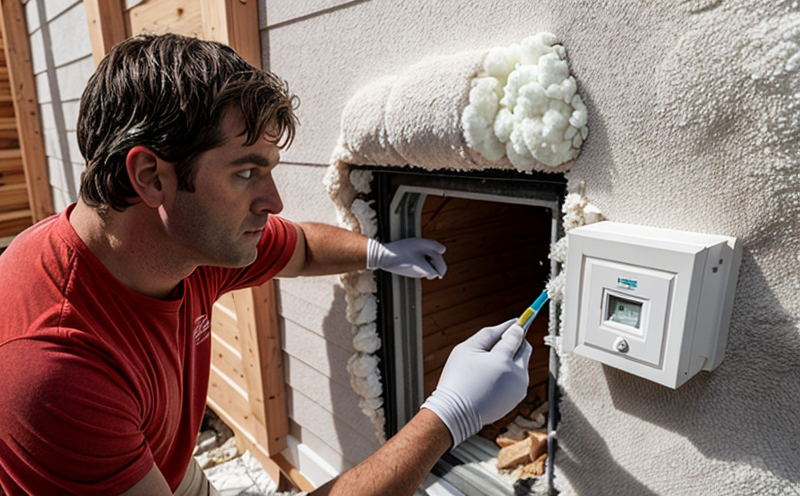ISO 8301 Steady State Heat Flow Measurement
The ISO 8301 standard outlines a method for determining the steady-state heat flow per unit area through insulating materials. This testing is crucial in ensuring compliance with building and infrastructure standards that demand accurate thermal performance data. The test measures the thermal conductivity of insulation materials under defined conditions, providing critical data for design and quality assurance.
The process involves placing a specimen between two plates that are held at different temperatures. Heat flows through the sample from one plate to another until a steady state is achieved. The heat flow per unit area is then calculated using this information. This method ensures uniformity in testing conditions, which is essential for accurate and comparable results.
The apparatus used in ISO 8301 testing includes a calorimeter, temperature sensors, and a means of controlling the temperatures at both ends of the specimen. The specimens are prepared to ensure they meet specific dimensions and tolerances as per the standard. This preparation ensures that the test results are not influenced by external factors such as surface roughness or thickness variations.
The acceptance criteria for this method strictly adhere to ISO 8301, which sets out the precision and accuracy requirements necessary for valid results. The repeatability of measurements is critical in ensuring consistency across multiple tests and laboratories. This standard also provides guidance on how to handle outliers and ensure data integrity.
Understanding the thermal properties of insulating materials is vital in constructing energy-efficient buildings and infrastructure. Accurate heat flow measurement ensures that construction meets both regulatory requirements and performance expectations. By adhering to ISO 8301, laboratories can provide reliable and consistent data, which is essential for stakeholders involved in building design and compliance.
This testing method is particularly important in sectors where energy efficiency is a priority, such as residential, commercial, and industrial buildings. Compliance with standards like ISO 8301 helps to ensure that insulation materials perform as expected under real-world conditions, thus contributing to the overall sustainability of construction projects.
Why It Matters
The importance of ISO 8301 testing lies in its ability to provide precise and consistent data on thermal conductivity. This information is essential for ensuring that insulation materials meet performance expectations, which directly impacts the energy efficiency of buildings and infrastructure.
Accurate heat flow measurement helps architects and engineers design structures that are not only functional but also environmentally sustainable. By using materials with known thermal properties, builders can optimize the use of resources and reduce operational costs. This testing ensures that the insulation used in construction projects is reliable and meets the necessary standards set by governing bodies.
The results from ISO 8301 tests contribute to better decision-making processes for stakeholders involved in building design and compliance. These data points are crucial not only for regulatory compliance but also for enhancing the overall performance of buildings, which can lead to cost savings and improved environmental impact.
Moreover, consistent testing ensures that materials perform predictably under various conditions, reducing the risk of costly mistakes during construction. This level of reliability is essential in creating structures that are resilient and energy-efficient, contributing positively to both economic and environmental goals.
Industry Applications
| Application | Description |
|---|---|
| Residential Buildings | Ensuring that insulation used in homes meets the necessary thermal performance criteria. |
| Commercial Buildings | Testing materials for energy-efficient design and compliance with building codes. |
| Industrial Applications | Evaluating insulating properties of materials used in manufacturing processes. |
| Retrofitting Projects | Verifying the effectiveness of insulation added to existing buildings to improve energy efficiency. |
| Testing Laboratories | Standardizing testing protocols for various types of insulating materials. |
| Sustainability Initiatives | Supporting projects aimed at reducing carbon footprints and improving energy efficiency. |
The ISO 8301 heat flow measurement method is widely used across various sectors, including residential construction, commercial buildings, industrial facilities, and testing laboratories. In these applications, the test ensures that insulation materials meet specific performance criteria, contributing to more sustainable and energy-efficient structures.
Customer Impact and Satisfaction
The primary impact of ISO 8301 heat flow measurement is in enhancing customer satisfaction by ensuring high-quality construction. By adhering to this standard, builders can provide reliable data on the thermal performance of materials used in their projects. This transparency fosters trust between clients and contractors, leading to more successful collaborations.
Compliance with ISO 8301 helps meet regulatory requirements, which is essential for both residential and commercial buildings. By ensuring that insulation meets the necessary standards, builders can avoid costly penalties and ensure long-term performance of their projects. This level of quality control also enhances customer satisfaction by delivering reliable and energy-efficient structures.
The testing method supports sustainability initiatives, contributing to reducing carbon footprints and improving energy efficiency. This aligns with growing environmental concerns and helps meet the demands of environmentally conscious clients. The reliability provided by ISO 8301 ensures that buildings are not only functional but also sustainable, leading to higher customer satisfaction.
By providing accurate data on thermal performance, ISO 8301 testing enables better decision-making processes for stakeholders involved in building design and compliance. This level of precision is essential for creating structures that meet both regulatory requirements and performance expectations, ultimately leading to more successful projects and satisfied clients.





